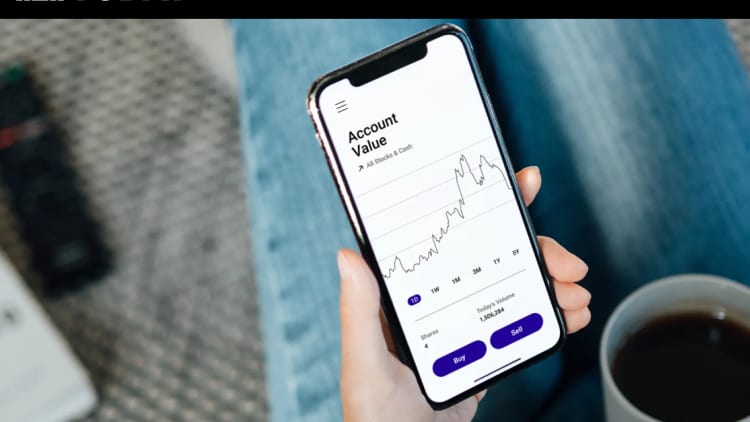[ad_1]
Gilaxia | E+ | Getty Images
Humans use mental shortcuts in everyday life to help process information and make speedy decisions. But they can lead to bad choices when it comes to personal finance.
Some of those poor outcomes are the result of “anchoring bias,” which can undermine a consumer’s rational thinking.
This cognitive bias causes the brain to overly rely on initial impressions or numbers to shape subsequent thoughts and judgments. In other words, that early information “anchors” future choices.
It’s “the idea that you get a number stuck in your head subconsciously,” said Jennifer Itzkowitz, associate professor of finance at Seton Hall University, who has studied anchoring bias in investing. “And it influences future decision-making.”
More from Personal Finance:
Your small business may qualify for a Covid-era tax credit
How to tell if your company has layoffs planned
It’s official: Student loan payments will restart in October
Humans are more likely to default to these mental shortcuts — known as “heuristics” in psychology jargon — when confronted by complex subjects like finance, when consumers may feel overwhelmed by information, Itzkowitz said.
“You have to be aware this bias exists or you will fall prey to it daily,” said Bradley Klontz, a certified financial planner based in Boulder, Colorado, and a founder of the Financial Psychology Institute.
Here are some ways anchoring bias may play a role in your financial life.
1. A 401(k) match can be an unintentional anchor
“Anchors” can be intentional or unintentional, said Klontz, a member of CNBC’s Advisor Council.
A 401(k) match can serve as an unintentional anchor. Companies choose the respective structure of their 401(k) match — and that structure may inadvertently influence a worker’s savings rate.
For example, a company may opt to pay a match worth up to 3% of a worker’s salary. As a result, workers may think saving 3% of their income in a 401(k) is adequate for their retirement savings — when it likely falls short.
Conversely, employers can use the anchoring concept to boost savings. For example, Google found that sending e-mails to its employees that promoted relatively high anchors (like a contribution rate of 10% or 20%) influenced workers to boost savings.

2. For shoppers, the first price seen sticks
On the other hand, many retailers use the anchoring principle intentionally to influence consumer buying behavior, Klontz said.
This often shows up when stores advertise a sale, he said.
For example, a retailer may mark down a pair of pants from $60 to $30. Consumers tend to judge the sale price relative to the original, so the new price appears cheap. But when viewed objectively, $30 isn’t necessarily a good deal for consumers — especially if a regular stream of store sales means the pants are never $60.
Take another example from the Corporate Finance Institute: If consumers first see a T-shirt that costs $1,200, and then see a second one that costs $100, they’ll likely see the second shirt as cheap. However, if that person had only seen the second shirt, priced at $100, they probably wouldn’t think it was inexpensive.
Jamie Grill | The Image Bank | Getty Images
Or, take this example relative to planning a vacation, from job site Indeed: A couple might find all-inclusive tickets to Hawaii for $800 each. Then, they subsequently find tickets to Puerto Rico for $400 each, but the tickets only cover airfare. The couple might choose the Puerto Rico trip to save money, but end up paying the same amount after additional costs for a hotel room and dining are included.
“The anchor — the first price that you saw — unduly influenced your opinion,” wrote Tim Vipond, board chair of CFI Education.
3. Investing apps: Starting small can leave you short
Some mobile apps for investing entice customers by suggesting they can get started with as little as $5, Itzkowitz said.
The advertisement is meant to bring investing to the masses in a low-cost way, but may inadvertently anchor users to a paltry savings amount, she said. In turn, savers may have a false sense of financial security, she added.
“Whatever people spend on their first stock purchase, they continue spending that exact same amount,” said Itzkowitz, who recently co-authored a research paper studying anchoring in investment trading platforms like Stash, Robinhood, SoFi, and Stockpile.
Encouraging investors to start with a micro-investment “leads to lower wealth accumulation in this brokerage account due to anchoring bias,” according to the paper.
This is true across all groups regardless of factors like income, age and gender, Itzkowitz said.
4. In negotiations, anchor bias is a tricky tactic
Companies and people use anchoring as a common negotiating tactic, relative to salary negotiations or a sale, for example, Klontz said.
For example, during the hiring process, a company may try to anchor a prospective hire to a low initial salary offer. Any increase from there may feel like a win for the prospective worker but be on par with what the employer had initially hoped.
Ultimately, the key to countering anchoring bias is to continually question your financial instincts.
“Assume these things are being used in nefarious way to separate you from your money,” Klontz said. “Always be second-guessing yourself.”
[ad_2]

